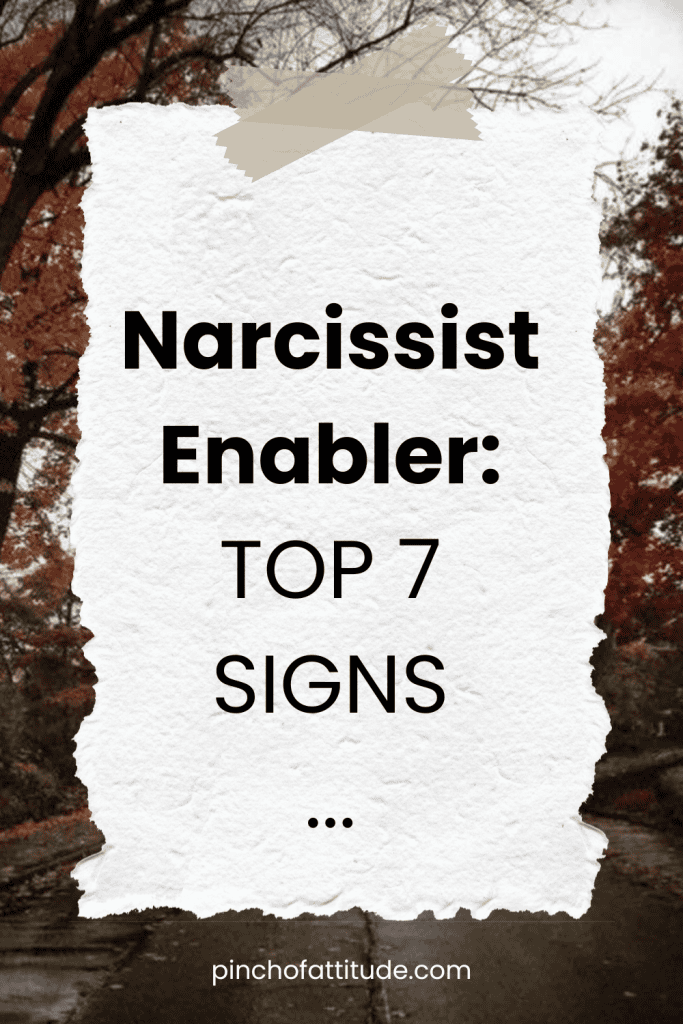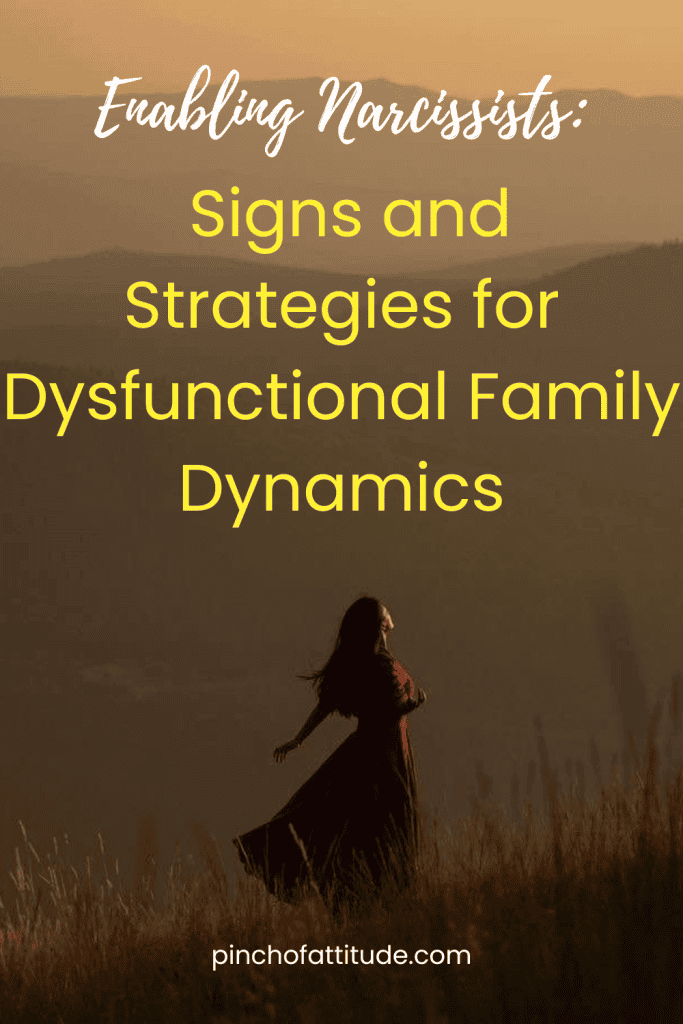Growing up, I always felt like there was an invisible force at play in our family, and I hated it so much.
My narcissistic mother was the undisputed queen of our household, her every word and action dictating the atmosphere around us.
She was my ultimate nightmare.
My father, on the other hand, was a quiet, almost passive figure, seemingly content to exist in my mother’s shadow.
Little did I know that he was playing an important role in perpetuating the toxic dynamics of our family.
He was one of my mother’s narcissistic enablers. I don’t blame him at all because he and I were in the same boat.
It’s a story familiar to many, where the influence of narcissistic enablers is both subtle and profound.
As I reflect on this complex dynamic, I’ve realized how important it is to shine a light on the often-overlooked enabler, the person who quietly allows narcissism to flourish.
- When you understand the signs of abuse and manipulation, you can avoid falling into the role of an enabler.
- Always put your mental and emotional health first by refusing to justify toxic behaviors and seeking support.
- Be conscious of your own needs and feelings, and always refuse to sacrifice them for the sake of others.
Table of Contents
What Are Narcissistic Enablers in the Family?

A narcissist enabler in the family is someone who, through their actions or inaction, contributes to the continuation of narcissistic abuse.
This behavior can be overt and obvious, or it can be more subtle and insidious.
They often prioritize the narcissist’s needs and feelings, turning a blind eye to the pain and damage being inflicted on others.
Enablers may do this out of fear, guilt, or a need to keep the peace in the family.
In my experience, by not calling out my mother’s manipulative tactics, my father made it easier for her to keep being who she was.
And because of that, he also contributed to the dysfunctional family dynamic that affected everyone in our family.
What Are the Signs of a Narcissist Enabler?
Understanding family relationships can be tricky.
But if you’re living with someone diagnosed with narcissistic personality disorder or showing narcissistic traits, it becomes even harder.
Roles are assigned, one of which is the narcissist enabler.
If you find yourself questioning the dynamics within your family, here are common signs you’re dealing with a narcissist’s enabler:
1. Lack of Understanding
One of the red flags that often characterizes narcissistic enablers is their lack of understanding of narcissism and its impact on their loved ones.
Enablers are usually clueless about the manipulative and abusive tactics employed by narcissists, failing to recognize the harmful patterns of behavior that characterize NPD.
This lack of awareness may have also stemmed from their lack of empathy, making it difficult for them to grasp the suffering when the narcissist abuses their victims.
2. Turning a Blind Eye
Enablers see the truth about the narcissist’s behavior but still choose to turn a blind eye to shield the narcissist from accountability.
This willful blindness stems from a complex interplay of factors.
They may fear the narcissist’s retaliation or the potential disruption when they confront the narcissist.
In some cases, they may also feel a deep sense of loyalty, believing that supporting the narcissist is their duty.
In my family, my enabler father prioritized maintaining a semblance of harmony, even if it meant sacrificing the well-being of other members of the family.
3. Refusing To Believe the Truth
People become enablers of narcissists due to a variety of factors, including the trauma bond that forms between the narcissist and the enabler.
This bond, characterized by feelings of guilt, fear, and dependency, can lead enablers to overlook or deny the narcissist’s toxic behaviors.
It is also possible that they fell victim to the narcissist’s gaslighting tactics, making it difficult for them to discern the truth from the narcissist’s distorted narrative.
Some enablers may also believe that exposing the narcissist’s behavior would bring shame or embarrassment.
4. Making Excuses for Bad Behaviors
Instead of addressing or challenging harmful actions, enablers actively try to explain and justify the narcissist’s side.
This apologetic stance on behalf of the narcissist shields them from accountability and reinforces the cycle of dysfunction.
By making excuses for the narcissist, enablers essentially validate their toxic behavior and reinforce their sense of entitlement.
They send the message that the narcissist’s actions are acceptable and excusable, even when they cause pain and suffering to others.

5. Not Open To Hearing the Other Side of the Story
Enablers often exhibit a striking disregard for the perspectives of those who challenge the narcissist’s narrative.
They may gaslight victims, dismissing their experiences and emotions as invalid or exaggerated.
In their minds, any form of mess is never the narcissist’s fault but attributed to someone or something else.
This closed-mindedness stems from a deep-seated belief in the narcissist’s superiority and a corresponding distrust of anyone who dares to question their authority.
6. Believer of Change
Despite witnessing the narcissist’s abuse, some may still cling to the belief that the narcissist can change.
This unwavering hope may stem from their own experiences with the narcissist’s uncanny ability to manipulate others to meet their own needs and desires.
They believe the narcissist’s words over the truth, perhaps hoping it would result in a restored sense of harmony within the family.

7. Flying Monkeys
Flying monkeys play an essential role in enabling a narcissist to inflict emotional abuse.
These individuals serve as loyal foot soldiers, carrying out their bidding and manipulative schemes.
Flying monkeys help the narcissist reinforce their sense of power and control by engaging in gaslighting to invalidate the experiences and emotions of the narcissist’s victims.
They may also spread rumors, gossip, and smear campaigns to tarnish the reputations of those who have been targeted by the narcissist.
Narcissistic Enablers and Their Roles in the Family Dynamic
Narcissistic enablers often act as the narcissist’s confidants, protectors, and even enforcers.
This dynamic in the relationship creates an environment where the abuser is tolerated, while the needs and feelings of family members are disregarded or ignored.
- The protector: Enablers may shield the narcissist from the consequences of their actions, making excuses and deflecting blame onto others. They may downplay the narcissist’s hurtful words or actions, protect them from facing criticism or accountability, or even lie on their behalf.
- The confidant: Enablers provide narcissists with a sympathetic ear and validation for their often distorted perceptions of reality. Enabling the narcissist reinforces their sense of entitlement, as they receive affirmation and support for their inflated ego.
- The enforcer: In some cases, enablers may carry out the narcissist’s demands. They may enforce the narcissist’s unrealistic expectations, silence dissent within the family, or even participate in the narcissist’s bullying or intimidation tactics.
Different Types of Enablers

While they may fall under a broad umbrella, enablers play an important but destructive role that contributes to the toxic environment in different ways.
Recognizing the different types and understanding their motivations is important for those seeking to break free and create a healthier environment for themselves and their loved ones.
Ignorant Enabler: Unknowingly Complicit in Abuse
The ignorant enabler is often blind to the narcissist’s manipulative tactics and the harmful impact their behavior has on others.
They may be unaware of the characteristics of narcissism or fail to recognize the signs of abuse within their relationship with a narcissist.
This lack of understanding can lead them to make excuses for the narcissist’s behavior, minimize the severity of the abuse, or even defend the narcissist’s actions.
For example, a wife may attribute her husband’s condescending remarks and constant criticism to his demanding work schedule, failing to recognize these as signs of narcissistic behavior.
Self-Serving Enabler: Prioritizing Personal Gain over Others’ Well-being
The self-serving enabler is motivated by their own needs and desires, often exploiting the narcissist’s manipulative tendencies to advance their own interests.
They may view the narcissist as a source of power, status, or financial support, turning a blind eye to the harm inflicted on others in exchange for personal gain.
For example, a business partner may overlook the narcissist’s unethical practices and willingness to exploit others, prioritizing their own financial benefits from the partnership.
Pollyanna Enabler: Refusing to Acknowledge Reality
The Pollyanna enabler is characterized by an unwavering optimism and a belief in the inherent goodness of others, even in the face of overwhelming evidence to the contrary.
They may refuse to acknowledge the narcissist’s manipulative behavior, instead attributing it to misunderstandings or temporary setbacks.
For example, a parent may consistently downplay their child’s narcissistic tendencies, attributing their behavior to teenage angst or a lack of maturity.
Why Does the Enabler Support the Narcissist in the Family?
Enablers are behaving the way they do in their relationship with the narcissist for various reasons. Here are the most common:
- Fear of setting off the storm: Enablers often live in constant fear of triggering the narcissist’s wrath, anticipating a hurricane of anger, retaliation, or even emotional blackmail. This can be paralyzing and lead them to suppress their own needs and feelings to maintain a semblance of peace.
- Tied by threads of dependence: Enablers may be emotionally, financially, or even physically dependent on the narcissist. This makes the thought of standing up to the narcissist feel like risking the very foundation of their existence.
- Hunger for approval and belonging: Enablers may desperately seek approval and acceptance from the narcissist, even if it means sacrificing their own beliefs and values. They enable the narcissist’s behavior, hoping to earn a pat on the back.
- Wrestling with self-worth: Because they struggle with their own self-worth, enablers find it easier to support the narcissist’s distorted perceptions of reality than to challenge them and risk rejection or abandonment.
- Bonds of loyalty and duty: Enablers may believe that they must preserve the family unit at all costs. This can blind them to the toxic nature of the relationship, leading them to tolerate and even defend the narcissist’s behavior.
- Sidestepping the battle: Enablers may find it easier to tiptoe around issues rather than engage in a heated confrontation with the narcissist. This may stem from their fear of conflict, a desire to avoid disruption or a belief that the narcissist will never change.
How Do I Deal With Enablers in My Narcissistic Family?
Dealing with a narcissist can be emotionally draining, even more so when they are surrounded by enablers who inadvertently reinforce their manipulative behavior.
Here’s how you can protect yourself from them like I did:
1. Choose Your Battles
Engaging in every confrontation can be ineffective. Instead, focus on addressing the most significant issues that directly impact your well-being.
Prioritize your energy and emotional reserves for these critical confrontations and try to maintain a sense of peace for less pressing matters.
2. Try To Speak Your Truth
Speaking your truth can help you reclaim your autonomy and challenge the enablers’ distorted perceptions of reality.
While it may not change their behavior immediately, it can help you break the cycle of self-doubt and being dependent on others.
By asserting your truth, you take a stand for yourself and set a boundary against their enabling behavior.
3. Limit Exposure With the Narcissist Enabler
To protect your well-being, set boundaries with the narcissist enabler by limiting exposure and controlling when you interact.
If that doesn’t work, take the next step and cut ties to protect yourself from further harm.

4. Stay Authentic to Who You Are
When you remain true to your values, beliefs, and emotions, you project a strong sense of self that is less susceptible to the enablers’ attempts to manipulate or control you.
You assert your individuality and demonstrate that you will not compromise your integrity to appease the narcissist or their enablers.
5. Educate Yourself on Narcissism
Understanding the truth about the narcissist and the impact of enablers can help you recognize the manipulation and protect yourself from their tactics.
A therapist can help you navigate the complexities of these relationships and provide additional support.
6. Set Goals for Personal Growth
By focusing on your own well-being, self-awareness, and emotional resilience, you strengthen your inner resources and create a protective shield against their manipulative tactics.
This inward journey allows you to focus on self-compassion, establish healthy boundaries, and develop a stronger sense of self-worth.
How To Avoid Becoming a Narcissist Enabler
To avoid becoming a narcissist enabler, you must try to maintain self-awareness, set healthy boundaries, and prioritize your well-being.
Recognize manipulative patterns, refuse to justify toxic behavior, and seek support when needed.
By staying true to yourself and building emotional resilience, you can navigate relationships with narcissists without enabling their harmful dynamics.

Related Posts:
- How to Protect Yourself From Narcissistic Family Members? My Personal Advice
- How to Escape a Narcissistic Family? My Guide to Your Safety
- 10 Commandments of the Narcissistic Family: The Code I Was Forced to Obey!
- 5 Things That Set Your Narcissistic Family Off!
- 12 Rules of a Dysfunctional Narcissistic Family: Sadly, They’re All Damaging
Frequently Asked Questions
What is the difference between a narcissist and an enabler?
A narcissist is someone with an inflated sense of self-importance, a deep need for admiration, and a lack of empathy for others. An enabler supports or encourages the narcissist’s behavior.
Can enablers change?
Yes, but it requires a lot of effort and support. They need to learn to set boundaries, assert their needs, and develop a strong sense of self-worth.
How do you help a narcissist enabler?
Help a narcissist enabler by encouraging self-awareness, gently challenging enabling behaviors, and guiding them towards professional help if necessary.
Can an enabler also be a narcissist?
Yes, an enabler can display narcissistic traits, acting in self-serving ways while supporting a narcissist. They may be drawn to narcissists because they share similar characteristics, such as a need for admiration and control.
Are enablers aware of their role or is it unintentional?
Some enablers may be consciously trying to protect the narcissist or themselves from the narcissist’s anger. Others may be unaware of the harm they are causing.


